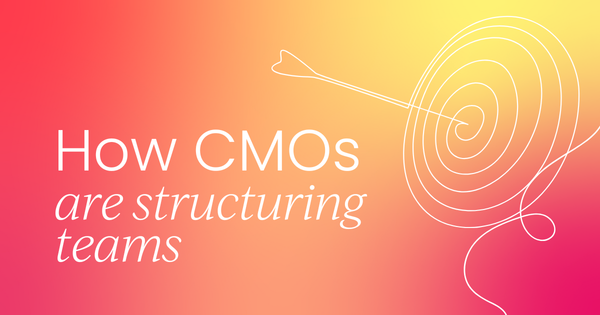The CMO Insights Report 2025, powered by Invoca, gives a detailed look into how 119 CMOs across a range of company sizes and sectors are structuring their teams to meet the demands of the moment.
From team size and role specializations to hiring priorities and performance metrics, one theme is clear: marketing is undergoing a structural transformation – leaner, smarter, more specialized, and more accountable than ever before.
Marketing teams are getting smaller but sharper
Despite the growing scope of responsibilities, most CMOs are operating with remarkably lean teams. Just 6% of respondents reported departments with more than 100 people.
In contrast, the majority (62%) have fewer than 25 marketing employees. Even more striking, nearly one in five (19%) report departments with fewer than 10 people, and 9% of respondents are operating as fractional or solo CMOs.
This isn’t necessarily a symptom of budget cuts – though economic caution certainly plays a role. It’s also a deliberate strategic choice. CMOs are favoring small, agile teams composed of high-impact specialists over sprawling, generalist-led departments.
This means the focus is shifting from size to precision: building teams where each member has a defined, performance-driven function tied closely to business outcomes.
Fractional leadership is also on the rise. While this data focuses on departmental structure, the 9% operating in fractional roles hint at a larger trend of companies turning to experienced CMOs on a part-time or contract basis – particularly among startups and resource-constrained environments.
Why generalists are in decline
So, if the modern marketing team is leaner, it’s also much more specialized. A defining insight from the report is the decline of the generalist.
In just one year, the proportion of marketing departments employing generalist roles dropped from 69% to 52%.
In other words, almost one in five organizations have started deprioritizing generalists in favor of specialists in less than 12 months.
This shift is most visible in roles like SEO, video marketing, and social media. SEO roles alone rose by 7 percentage points.
Video marketing saw a staggering 17-point increase, reflecting the growing dominance of short-form platforms and video-first strategies. Social media roles grew by 5 points, suggesting a continued appetite for real-time engagement.
So, what’s driving this move to specialization?
Part of the answer lies in the complexity of the platforms. As marketing ecosystems become more intricate, shaped by AI-driven search, algorithm changes, and fragmented media consumption, CMOs need team members who understand the nuances of individual channels.
Because small mistakes can tank campaign performance, surface-level knowledge just isn’t enough.
Moreover, increased investment in Account-Based Marketing (ABM) – which rose from 27% to 41% – further underscores a desire for roles that bridge marketing and sales and create personalized, revenue-focused experiences.
Changing perceptions of what drives growth
The report doesn’t just look at who’s on the team, but what’s working. CMOs were asked to identify which channels contributed most to revenue and growth, and the results reveal changes in perceived value.
Content marketing and demand generation (two activities often seen as foundational to growth) saw notable year-over-year declines.
Content dropped from 55% to 43%, and demand gen from 52% to 43%. These changes could reflect a recalibration in expectations around top-of-funnel efforts, which are hard to tie directly to revenue.
At the same time, email marketing grew in perceived importance, increasing from 30% to 35%. Product marketing rose even more sharply, from 31% to 37%. These are channels closely aligned with customer retention, product adoption, and measurable ROI – factors that have become more urgent in increasingly budget-conscious orgs.
Brand marketing and paid media held relatively steady, with modest gains or losses that suggest they’re still seen as useful but must now earn their keep in more data-driven performance frameworks.
SEO and social media remained stable, perhaps due to their long-term value and evolving roles in awareness and discovery.
Together, these changes signal a shift toward full-funnel thinking. CMOs are not abandoning content or brand, but they’re increasingly evaluating everything through the lens of measurable impact.
Data literacy takes center stage
In a particularly telling insight, the report found that data literacy has overtaken creativity as the most important hiring priority among CMOs.
62% of respondents named it their top requirement, compared to 60% for creativity. This marks a significant evolution in how marketing talent is evaluated.
CMOs want marketers who can extract insights from data, build attribution models, optimize performance, and translate analytics into strategic decisions. Creativity is still critical but it's no longer sufficient on its own.
Teamwork ability (56%) and foundational marketing knowledge (54%) also ranked highly, pointing to a preference for well-rounded professionals who can function collaboratively while delivering against KPIs.
This focus on data fluency is likely a response to ongoing scrutiny over marketing ROI. With tighter budgets and higher expectations, CMOs must now justify every dollar – and they need a team that can help them do that in real time.
Passion, curiosity, and inclusion still count
Peter Isaacson, CMO at Invoca, stresses the importance of passion and curiosity, calling them “the two traits that separate good marketers from great marketers.” He argues that in a climate of constant change – economically, technologically, and culturally – those who are driven to learn and adapt will thrive.
John McKinney, Director of Marketing & Partnerships at Cornerstone Licensing, highlights another important point: the value of inclusive hiring. He shares how his team deliberately considers women returning to work after extended parental leave as a way to find high-caliber talent often overlooked by competitors.
These perspectives serve as a reminder that while data may shape decisions, marketing is still fundamentally a human endeavor. The best teams are not just technically capable – they’re emotionally intelligent, curious, adaptable, and values-driven.
In short
CMOs are leading a full-scale redesign of how marketing teams operate. They are trading breadth for depth, size for specialization, and intuition for insight.
In this new model:
- Teams are smaller but more focused.
- Roles are highly specialized and aligned to performance.
- Channels are chosen based on direct contributions to revenue.
- Hiring emphasizes analytical capability as much as creative potential.
- Human traits like adaptability, curiosity, and empathy remain quietly powerful differentiators.
The modern CMO isn’t just a marketer and the departments they lead in 2025 reflect that: agile, accountable, and aligned to what matters most.
For more stats and insights like these, get your copy of the CMO Insights Report 2025, your guide to understanding the modern CMO's priorities, strategies, and challenges.







.png)









 Follow us on LinkedIn
Follow us on LinkedIn





